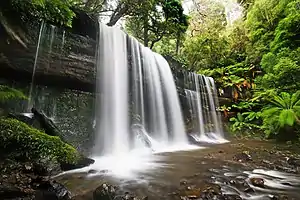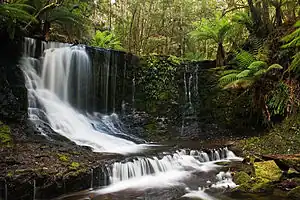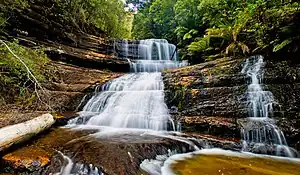


The Three Falls Circuit is a 7.5-kilometre (4.7 mi) circuit in Mount Field National Park in the Derwent Valley region of southern Tasmania. As its name suggests, the route traverses through the park's three most important waterfalls: Russell Falls, Horseshoe Falls and Lady Barron Falls, in addition to some of the world's tallest trees on the Tall Trees Walk.
Understand
Many come to Mount Field National Park solely to see Russell Falls – and while it is labeled as a "must-see" by the Tasmania Parks and Wildlife Service, few truly explore the park's other jewels: the two other waterfalls (Horseshoe and Lady Barron) as well as some of the world's tallest trees. Even though this track does not cover the park's alpine jewels, you're still bound to explore a true Tasmanian treasure.
Waterfalls aside, the track passes through temperate forests (but not alpine temperate forests), but the vegetation changes are still noticeable every kilometer you walk. One moment, you may see a plethora of swamp gums and Tasmanian ferns the next.
The entire circuit is classed as a grade 3 walk, with some parts as grade 2, under the Australian Walking Track Grading System. This means that there may be some steep sections, but the walk overall should be doable for most walkers who are fit enough. The most strenuous part of the track has to be climbing 200 stairs near Horseshoe Falls, and 239 steps a kilometer east of Lady Barron Falls.
Get in
The same way as you'd get into Mount Field National Park. As soon as you enter the park's gates, the visitor centre should be on the right. Parking at the visitor centre can be tricky, though, but there's an overflow carpark on the left of Lake Dobson Rd (C609). Enter the visitor centre, then use the back door to start your journey towards Russell Falls.
Prepare
You will not need any special hiking equipment to bushwalk this circuit, though having hiking boots will help you not slipping (the boardwalks get very slippery). A good jacket is also highly recommended as it can be cold and windy, even during the summer (making a good jacket a must during winter). Rain at Mount Field can also be very unpredictable – make sure you check BOM for the forecast is – even if there's a bitter-so-slight chance of rain, bring a light rain jacket.
You will also need a Tasmanian parks pass to enter Mount Field National Park.
Walk
While you can walk the circuit in either direction in theory, most do the circuit anticlockwise (visitor centre–Russell Falls–Horseshoe Falls–Tall Trees walk–Lady Barron Falls–visitor centre); hence, this page will describe the itinerary anticlockwise. If you plan on one of the few travellers who do the circuit clockwise, remember to interpret everything the other way around.
Russell and Horseshoe Falls Track
Russell Falls Track (coloured on map) of the grand circuit is by far the most traversed section, with most travellers on this trail only headed for Russell Falls. Starting at the 🌍 visitor centre, the track starts out flat, with few slight gentle uphills. Your first impression of the track will be tall trees – specifically swamp gums, but these are nowhere near as tall as those you'll encounter on the Tall Trees Walk (but they're still the world's tallest flowering plant). Some of these may have fallen next to the track (this is very common after some consistent heavy rain), but this truly allows you to visualise how tall these trees are. If you're bushwalking at night, you may see some glowworms, but ensure you turn your torches off.
After about one kilometer, you will have arrived at the first major point of interest, and perhaps the most important of them all on this track, 🌍 Russell Falls. It should come as no surprise why the falls have been labeled as a "must-see" by the Tasmania Parks and Wildlife Service after staring at the fall's beauty at first glance.
Once you've spent enough minutes staring at the mossy green falls, you're going to hate staircases, because the short-albeit-treacherous Horseshoe Falls Track (coloured on map) is entirely comprised of 200 steps.
Once you've climbed up the 200 steps, you'd have arrived at your next stop, 🌍 Horseshoe Falls. It's named as such because it quite literally looks like a horseshoe when there's water flowing but also when there isn't too much rain. Continue past the small junction until the very end for a better view of the falls (and if you want a good photo spot). For photographers, unless you visit the park early in the day, the area can become crowded, making it difficult to take a photo.
Tall Trees Link Track and Tall Trees Walk
After you've spent a decent amount of time at Horseshoe Falls, turn back for 100 meters and then follow the signs to Tall Trees Walk. Continue walking for about 600 meters – this 600 m is the Tall Trees Link Track (coloured on map), and while there isn't anything uniquely spectacular along this track, every meter you walk, you should be able to notice the height of the trees gradually increasing, until you reach a massive junction with signs pointing to the Tall Trees Walk in being in either direction – this sign marks the beginning of the Tall Trees Walk (coloured on map).
Along the route, there is a small 🌍 clinometer that allows you to measure the angle between the ground and the top of the trees – if it exceeds 58°, then you can be sure that the tree is above 300 feet (≈91 meters).
The trees that are along this walk are swamp gums – which can live for many centuries (the PWS claims that most of the largest trees found here were still growing when Abel Tasman visited Tasmania in the 17th century).
Once you've walked the 1-kilometer loop (with one side twice), you will need to cross Lake Dobson Road (C609) to get to Lady Barron Falls Circuit. Cross this road with extra care – oncoming traffic on the unsealed road pay a blind eye to pedestrians on this road, and can often be coming at high speeds. The bends also mean that it can be difficult for drivers to see you crossing – only cross when you are absolutely sure that the road is safe to cross.
Lady Barron Falls Track
The longest section starts you've crossed Lake Dobson Road, and mind you, you will not have passed the halfway mark at that point. Most bushwalkers usually turn back at this point, as Lady Barron Falls is not as spectacular as the other two falls.
For the next 1 kilometer, the track slowly winds through the temperate forest, narrowing as you get closer to the falls. At the end of the 1 km, you will reach a junction – continue straight for 5 minutes to reach the third and final waterfall on this circuit, 🌍 Lady Barron Falls, a multi-tier low-level cascading waterfall. This waterfall may not be as spectacular as Russell or Horseshoe Falls, but it's still a sight worth visiting in its own right, especially if you have the time for it.
After you've spent a few minutes at Lady Barron Falls, head back and once you've reached the junction, turn right and continue for 1.2 kilometers. This section of track is narrow, but passes through many bridges with lots of noticeable vegetation changes, until you reach a set of stairs. Normally, you'd think that you'd be heading down given you walked up 200 steps to get to Horseshoe Falls, but given the elevation changes, you'll actually be climbing up 🌍 239 steps. There are plenty of opportunities to take a break, though – often, these are perfect photo spots, too.
After your treacherous trek up the stairs, continue ahead for a few hundred meters until you arrive at Lake Dobson Road (C609) again. Follow the road with extreme care and stick to one side till you reach the visitor centre, where the circuit ends. After 2 hours of walking, treat yourself to something cool or warm (depending on the weather) at 🌍 Waterfalls Cafe and Gallery (open 9AM–5PM daily) – while things might be a bit pricey at this cafe, but it's well-deserved if you persevered until the end.
Stay safe
Overall, the Three Falls Circuit is a very safe track, but as with any Tasmanian hiking trail, take the following precautions:
- Never underestimate the cold – it's Tasmania, and the weather can quickly change from bright and sunny to rainy (and even snowy at times). Bring an adequate jacket and a rain jacket if the forecast suggests it will rain (even the slightest).
- Consider wearing hiking boots – the many boardwalks are often slippery. While there are various nets to prevent you from slipping, accidents can still happen.
- Leave enough time to do the trail – sometimes you might spend more time gazing at the waterfalls than you initially planned. That, along with the weather, means that you should allow enough time to turn back, need it be.
- Finally, as Captain Obvious as it may sound, lookouts and railings are there for a reason – don't attempt to climb them.
Go next
Mount Field National Park has two sections in practice: the lower section which contains this circuit with Tall Trees Walk, and the upper alpine section home to some of the state's most impressive yet easily accessible tarns, lakes and alpine hikes. If you're visiting during winter, then consider skiing at Mount Mawson, one of Tasmania's two skifields.
Other nearby destinations include Southwest National Park (if you enjoyed Tall Trees Walk, then you'll also enjoy the Creepy Crawly Nature Trail) and its many HydroTasmania locations, Maydena, New Norfolk, or to the state capital, Hobart.